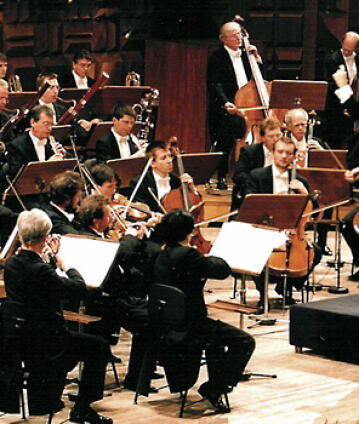Claudio Abbado’s Beethoven cycle from Rome

Only at the end of his tenure as chief conductor of the Berliner Philharmoniker did Claudio Abbado decide to give a performance of the complete symphonies of Ludwig van Beethoven. The venue was the Accademia Nazionale di Santa Cecilia in Rome. In these performances, the monumentality of earlier times was replaced by a leaner, driving energy. The Financial Times spoke of a “revolution”.
The audience applauded wildly after this Beethoven masterclass, demonstrating not least their gratitude at experiencing Claudio Abbado as a conductor of unbroken creativity, after he had spent several months overcoming a serious illness. Above all, it was the sinewy, driving interpretations themselves which led to standing ovations after each concert. Instead of the monumentality of earlier times, “something leaner, earthier, more experimental emerges here: something that borrows from the period movement’s wardrobe without causing a personality change”, according to the Financial Times. This stylistic change is also apparent visually: in contrast to previous years, Abbado employs a reduced string section for the symphonies. A new edition of the score by Jonathan Del Mar is used, which reflects the current state of research. For Abbado, these innovations are not just for their own sake, but are merely the means to revealing the core of Beethoven’s music. He described his point of reference in this question as follows: “If you try to look at Beethoven’s world objectively, then an interpretation à la Haydn is just as wrong as an interpretation à la Wagner. Ideally it should be – and this is the difficulty – Beethoven. “
Although orchestra and conductor performed all the Beethoven symphonies in Rome, the Ninth was not recorded at the time as the work had been produced for television just a few months before for the European Concert in May 2000. This recording is also available in the Digital Concert Hall.
© 2001 EuroArts Music International
Related interviews
Artists
Our recommendations
- Claudio Abbado conducts a Beethoven Gala at the 1991 New Year’s Eve Concert
- Claudio Abbado conducts famous final movements at the 1999 New Year’s Eve Concert
- Claudio Abbado conducts works by Schumann and Berg
- Claudio Abbado conducts Mozart’s Requiem at Memorial Concert for Herbert von Karajan
- Claudio Abbado conducts Beethoven’s Ninth Symphony at the 2000 Europakonzert in Berlin
- 1996 Europakonzert from St Petersburg with Claudio Abbado